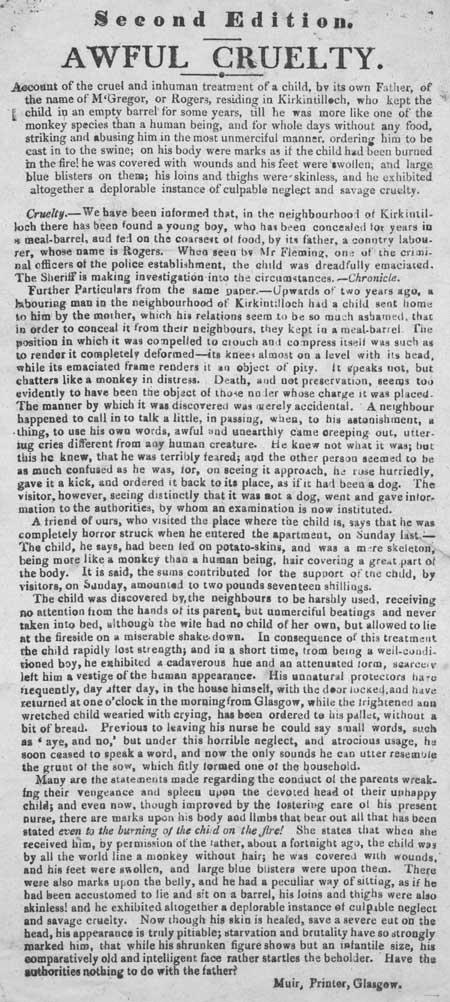The Context
Your example sentence comes from an undated broadside sold in Glasgow narrating a case of profound child abuse that occurred near Kirkintilloch, about 10 miles away. The broadside cites an article from the Glasgow Chronicle, a weekly newspaper in circulation from 1827–55.
Sold in the streets, broadsides were the tabloid press and clickbait of their day and for workers and artisans, the only source of news beyond word of mouth. Until repeal of the newspaper tax in 1855, the price of a newspaper was out of reach for the working classes, but broadsides, single printed sheets telling of some lurid crime or a public execution, only cost a penny.

The Chronicle article was picked up by four English newspapers, all in March 1839: first, the London Examiner, 3 March; then the Worchestershire Chronicle, 7 March; and the Leicestershire Mercury and the Hereford Times, 9 March. These dates suggest that the events reported in the Glasgow newspaper and sensationalized by the broadside will not have occurred too much earlier than, say, February 1839, the "fortnight” mentioned in the broadside.
The Grammar
In Tudor English, ashame was used as an active verb:
[M]ay it not greatly ashame christian princes and others, that spoyle and suffer the kirk of god to be spoyled … —Robert Pont, Against Sacrilege: Three Sermons, 1599. EEBO
The verb was still in current usage when this broadside was written:
Probably there were some that were backward at first to bring their offering, but their neighbours’ forwardness stirred them up and ashamed them. — Walter M'Gilvray, The Portable Folio Family Bible, 1851, 84.
I have heard gentlemen, who have visited these kinds of dens in London, say, that they have found men and women sleeping together, three and four in a single bed, that they have not disturbed or ashamed them in the least, by discovering them in these situations… — Joseph Kay The Social Condition and Education of the People in England, 1863, 97.
Even in Middle English, however, the attestations for the participle in a passive construction — or as we would parse it today, a predicate adjective — outnumber those of the verb. This tendency, of course, led to the final disappearance of the verb.
In 1839, however, one could still call ashamed a past participle.
This only brings us a little way further in parsing the relative clause:
… which his relations seem to be so much ashamed
The antecedent of the relative pronoun which is either child — in which case one would expect of which his relations seem to be ashamed— or it is the whole clause, i.e. the mother sending him his illegitimate child “ashamed” his relations, and this cast in the passive voice — in which case one would expect by which his relations seem to be ashamed.
Whether one parses the verb were ashamed as passive or as a linking verb with a participle used as an adjective, the rules of 19th century grammar English would require a preposition. The most logical conclusion is a typesetter’s error.

